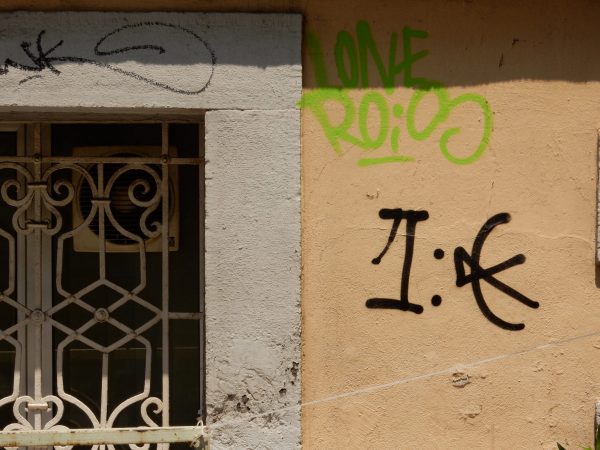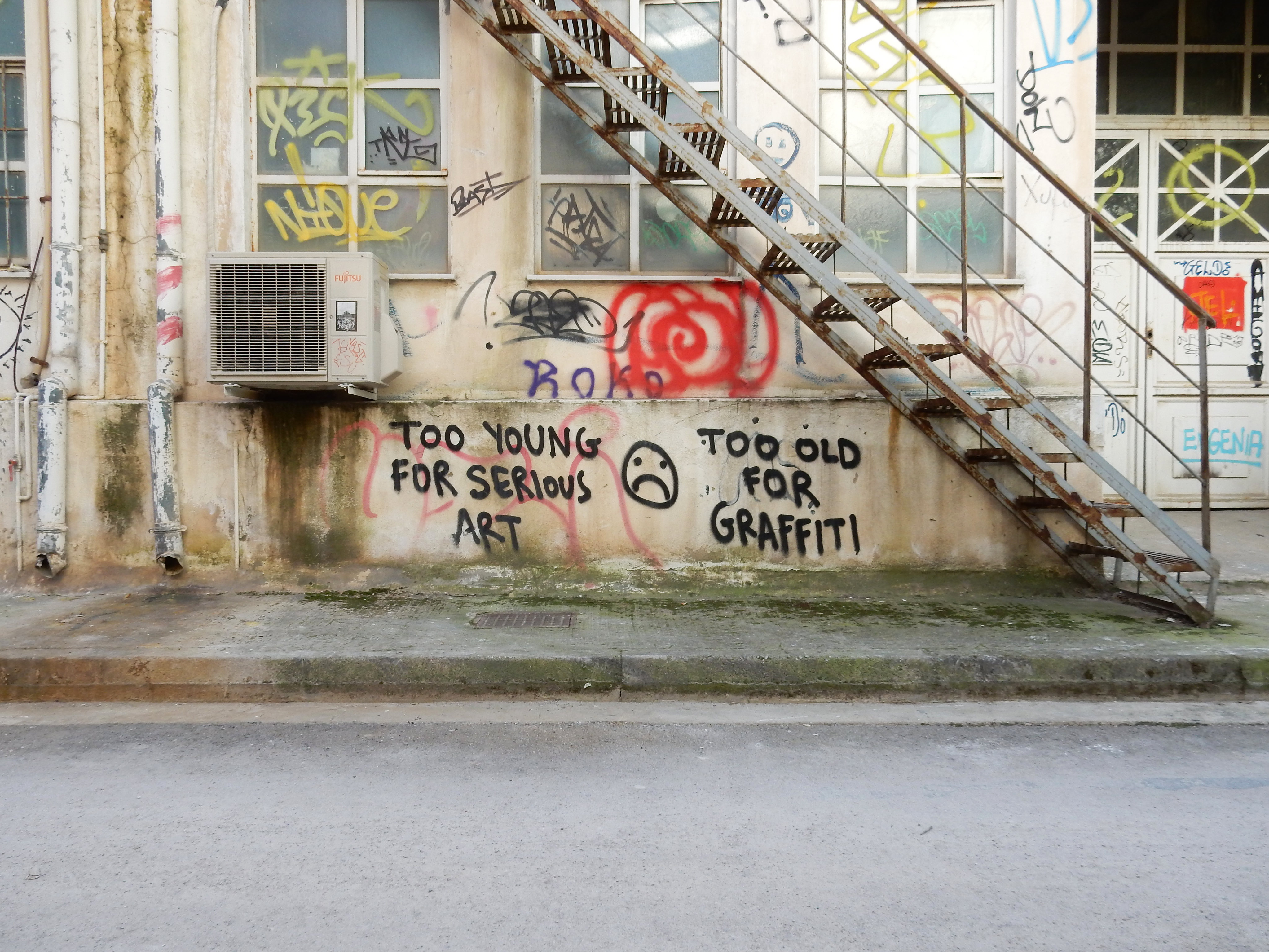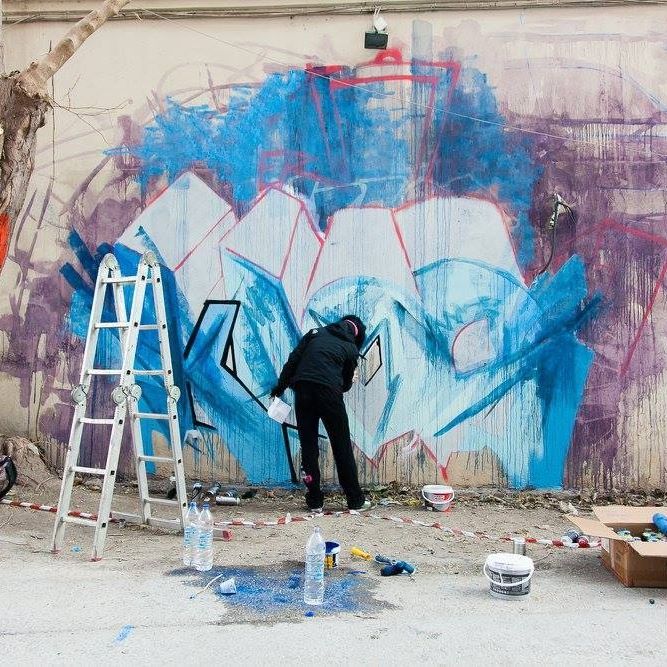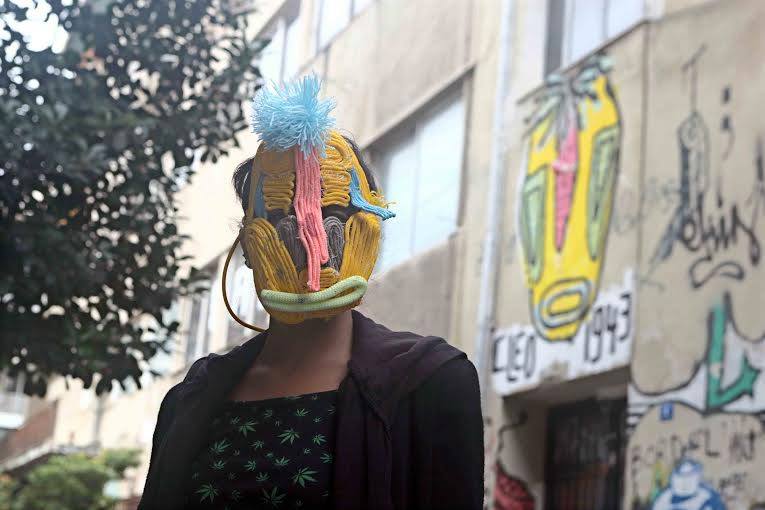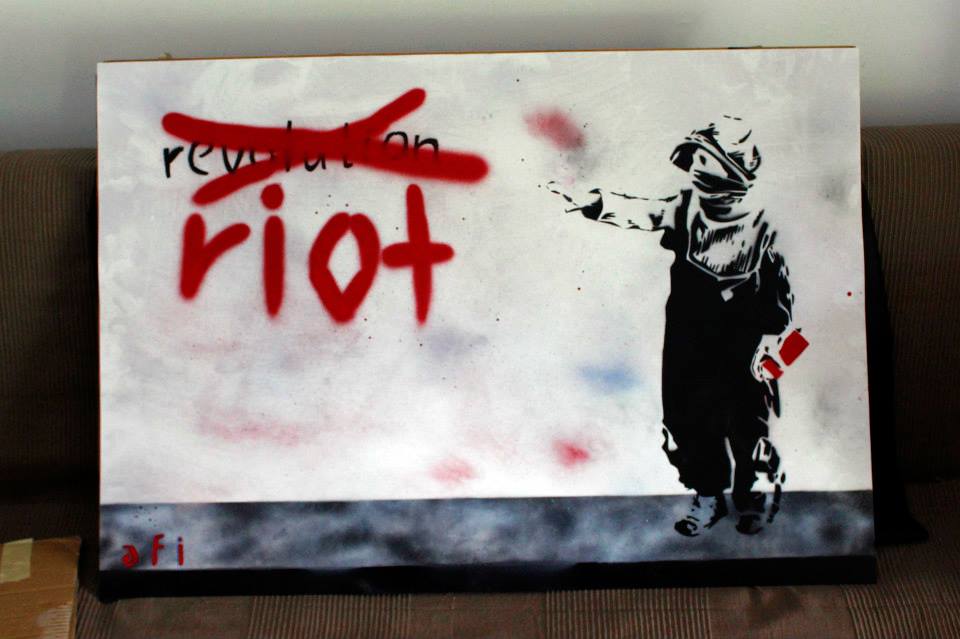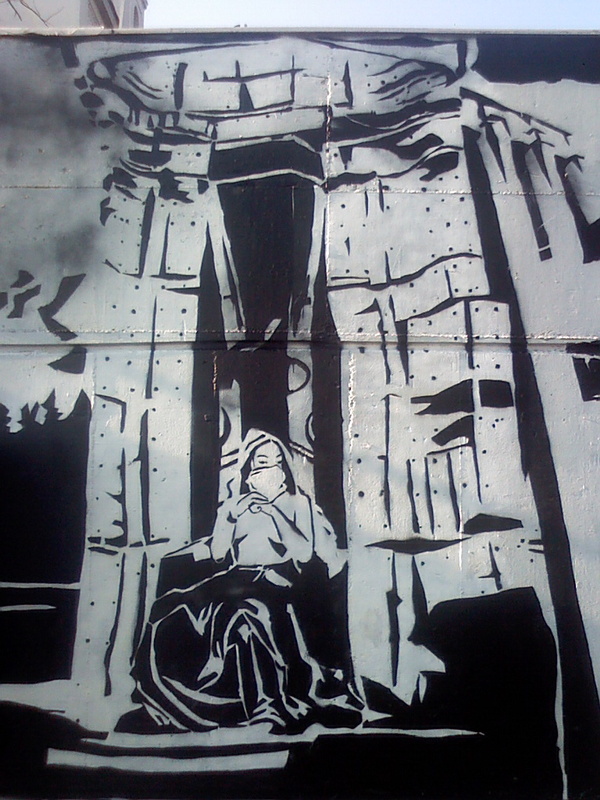If you’ve spent any time in Athens in the past year chances are you’ve stumbled upon a curious tag stating simply 1€ (or sometimes One Yuro), written compulsively all over the city. It can be found on obsolete urban objects and surfaces, parking barriers, electricity boxes, and vacant shop windows. At times the tag is accompanied by drawn figures, usually just a vague wavy outline, at others the pieces feature short words or phrases. In all of its iterations, 1€ functions as a powerful comment on how the economic rhetoric of crisis and austerity has come to permeate and determine the collective social perception, drawing attention to the devaluation of the urban landscape as well as the human body in that very context.
The artist behind the tag, currently a student at the Athens School of Fine Arts, kindly spoke to me about the project, his creative process, and how the crisis has impacted his personal biography. For more of his work have a look at his Instagram.
What is your relationship with the city of Athens? Did you grow up there? How do you relate to the city and how has your understanding of it developed over the years?
No I didn’t grow up in Athens, I grew up in a small town called Saronida about an hour away from Athens towards Sounio. I started painting walls around there with my homies Link and Aikon from the Oaths crew, but back then I didn’t write One Yuro. Around 16 years old, (2011) my parents decided it would be best for us to move to Wisconsin U.S.A due to the crisis in Greece . We have family there from my mothers side so it was “easy” for us to get help with finding jobs for my parents which was the main purpose of our move. So 4 years later, at 20 years old I came back to Athens and lived with my grandpa and my brother who never moved with us to America and now I’m studying at the fine arts university here and I’m going on my third year now. So technically I haven’t really lived in Athens that much. All I can say about Athens is that its like no other city, so hectic and crammed and free in a way. In America its illegal to drink beer in public, here its not even illegal to piss in public, so I kinda like that in a way, you can get away with stuff so easily here.
When did you start writing One Yuro/1€? Is it your first project in the realm of graffiti/street art/public writing?
I don’t know if it’s a project per se, I just like writing it and seeing my tags around the city, I just like doing it. Its been about a year, I started writing in Athens with my homie Cine from the Drops crew, he got me hyped to get the tag up. I had thought about the tag but never tagged it around on walls, I would write it in some of my paintings or drawings but Cine is the guy who got me started in Athens. And yes I think it’s the first time I am taking it semi seriously but not really, its all just for fun.
How did the tag originate, what does it mean to you, and, if at all, how has it shifted since you started?
The name came from a friend of mine who was having an argument with his girlfriend at the time about money, not a lot of money, I think it might have been a euro or two or something like that but it really got to me. I write it mostly cause we are the generation that has to survive with nothing. Our generation is the generation of the One Yuro in a sense: crumbs only, no bread. It does shift from time to time, sometimes its just sarcasm for me or somebody else might see it that way or whatever, at the end of the day its just a tag and I encourage anyone to take it in their own way.
How do your current studies at the Athens School of Fine Arts connect to your creative practice in public space? How has the professional training you have received influenced your work as One Yuro?
I don’t know, It’s a very good school with very good training so it has influenced me in many different ways, but whatever, what I do in the streets is not what I do in there. Graffiti is not like painting for me, it’s a totally different field and feeling that you can’t get with painting canvas or whatever else. When I go out and write I don’t take my time usually, I do something quick and keep moving, I wont really try and make it look good as if it were one of my paintings. I like the adrenaline from doing it, even if it’s a tiny tag or whatever.
When I spent time in Athens over the summer this year, much of it around Gkazi, Petralona, and Tavros, I noticed your tag written almost compulsively all over the neighborhood, often covering objects such as electricity boxes or vacant shop windows. Sometimes your tag is accompanied by more elaborate figures or drawings. How do you go about your practice? How do you select the spaces and objects you write on, and how does your more figurative work come in?
I start by noticing a free spot and I try not to go over anyone else—even if it is a toy like myself—or a nice spot that will be easily seen. I just go out on walks and whatever crosses my path and when I like it or I feel I should do it then I do it. I don’t know, I like square shapes, like electricity boxes and windows. I guess you could say the spot calls me to go paint it and then it also tells me what to paint on it.
The figures that you draw often assume fragmented, fractured, precarious forms, what do they mean and represent to you?
Usually whatever I do is with one line, most of the characters. The act of not letting go from the cap or from the pen is a nice free feeling and fast as well. I don’t know what they mean to most people, or to myself for that matter. Sometimes I do this sometimes I do that sometimes I’m happy sometimes I’m sad basically. So my characters will either represent me in my own state in that moment, or sometimes it will just be something I think will be funny or crudely funny. Either way I do what I do in the moment, I might do something again and again, or in a same kind of way, but always in that moment trying to capture the most inner feeling and the first thoughts, could be happy, sad, angry, hungry, horny, whatever, I’m doing it.
Sometimes your tag and artwork are accompanied by short, evocative statements, or by the letters Φ.Π.Α, can you talk about that a little bit?
Φ.Π.Α is tax. So I sometimes write One Yuro tax or + One Yuro tax, in a way making fun of our state as a country and its taxes. Sometimes I put the minus symbol – but either way its just a small little statement on that. And yeah I write other stuff, too, whatever comes to mind. Sometimes 1€ debt or 1€ sex or acropolis for sale: 1€, whatever will pop up, just small little stupid statements that anyone can build their own opinion on. My work is a whore and everyone takes their ride trying to figure out what this One Yuro dude is trying to say. It’s super entertaining. But yes nothing I do is random in the sense that, I myself know why I write these things when I write them, but also I like to give people the option of trying to find their own meaning to it. So most of the stuff I do and write could be taken by anyone in a whole different context, sometimes even in a bad way you know? But its all in the game and its nice to see other people’s perspectives.
Do you generally work in daytime or at night? What kind of reactions do you get from people that happen upon you while writing?
I usually work at night because I don’t want to be seen or get in some kind of trouble really. But even in the day time I will do little tags if I’m walking around town for some reason, I just haven’t really gone out on a rampage in the daytime and when I go out that’s what I usually like to do, compulsively go around and leave marks. I have met some people who encourage you and say bravo, most people wont speak to you obviously, but very rarely I have been chased or yelled at from a balcony. I’ve been arrested once though with a bunch of friends but the cops were pretty cool and just took us to the station and then let us go easy. But yeah graffiti is everywhere here nobody cares anymore if you paint a little more.
What does the term crisis mean to you and how has “the crisis” impacted your everyday life as well as your creative work and practice?
It has impacted me quite a bit. My parents are still working in America and I’m living here away from them. They help me and my sister out as much as they can economically till we both finish our studies. So its still impacting us but I am truly thankful for my parents’ help because its just not possible to live a comfortable life with the salary from any old job in Greece. Especially if you have three kids and only one parent is working. So yes I feel everyone else who is struggling to make ends meet every single month. Over time the crisis might get better but probably my best bet would be…20-30 years until this country will be working again—unless someone buys it cheap for One Yuro!
Let’s talk about Documenta? As an ASFA student I assume you’ve had at least a tentative interaction with the exhibition and are aware of the many discourses around it. Also many of your artworks exist in the immediate vicinity of the exhibition venues, is that deliberate or accidental?
It’s kind of accidental, i went to some of the documenta exhibitions. I only liked the synthesizer and the musical furniture. Not much else rocked my boat though. Sorry documenta!
Do you consider yourself a political artist?
Art is political.
—
This interview was conducted via email in October 2017.
Questions and editing by Julia Tulke.

